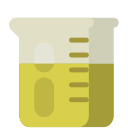Naphtha: Difference between revisions
Rosyriveter (talk | contribs) corrected recipe in description, spelling error, deleted an extra "also", changed wording from "environmentally-friendly" to "benign". |
m Footer Infobox |
||
| Line 4: | Line 4: | ||
| State = Fluid | | State = Fluid | ||
}} | }} | ||
{{ | {{outdated}} | ||
'''Naphtha''' is a petrochemical [[:Category:Fluid products|fluid product]] which is created solely as the result of processing {{infoicon|Light Oil}} in the [[Distillation (Stage III)]]. It has many applications such as the production of {{infoicon|Rubber}} and {{infoicon|Plastic}}. | '''Naphtha''' is a petrochemical [[:Category:Fluid products|fluid product]] which is created solely as the result of processing {{infoicon|Light Oil}} in the [[Distillation (Stage III)]]. It has many applications such as the production of {{infoicon|Rubber}} and {{infoicon|Plastic}}. | ||
While {{infoicon|Diesel}} can be converted into [[Naphtha]] at a ratio of 4:3, doing so generates an additional {{infoicon|Sour Water}} byproduct which must then also be handled. [[Flare|Flaring]] Naphtha is one method to prevent refinery arrays from locking up due to output backups at the cost of 2 units of {{infoicon|Air Pollution}} per unit flared. However, a more benign method of disposal of excess Naphtha is to burn it in a [[Boiler (Gas)]] to generate {{infoicon|Electricity}}. Even if the Electricity goes unused, this process reduces the amount of Air Pollution created to 2 units per 3 units burned with the added expense of {{infoicon|Water}} used to generate {{infoicon|Steam Hi}}, though this can largely be mitigated through the use of [[Cooling Tower]]s. | While {{infoicon|Diesel}} can be converted into [[Naphtha]] at a ratio of 4:3, doing so generates an additional {{infoicon|Sour Water}} byproduct which must then also be handled. [[Flare|Flaring]] Naphtha is one method to prevent refinery arrays from locking up due to output backups at the cost of 2 units of {{infoicon|Air Pollution}} per unit flared. However, a more benign method of disposal of excess Naphtha is to burn it in a [[Boiler (Gas)]] to generate {{infoicon|Electricity}}. Even if the Electricity goes unused, this process reduces the amount of Air Pollution created to 2 units per 3 units burned with the added expense of {{infoicon|Water}} used to generate {{infoicon|Steam Hi}}, though this can largely be mitigated through the use of [[Cooling Tower]]s. | ||
{{Footer Infobox}} | |||
{{ | |||
Revision as of 06:28, 5 May 2023
Naphtha is a petrochemical fluid product which is created solely as the result of processing Light Oil in the Distillation (Stage III). It has many applications such as the production of Rubber and Plastic.
While Diesel can be converted into Naphtha at a ratio of 4:3, doing so generates an additional Sour Water byproduct which must then also be handled. Flaring Naphtha is one method to prevent refinery arrays from locking up due to output backups at the cost of 2 units of Air Pollution per unit flared. However, a more benign method of disposal of excess Naphtha is to burn it in a Boiler (Gas) to generate Electricity. Even if the Electricity goes unused, this process reduces the amount of Air Pollution created to 2 units per 3 units burned with the added expense of Water used to generate Steam (High), though this can largely be mitigated through the use of Cooling Towers.
Recipes
Below are all the recipes which contain this item. Note that some of them may be locked behind Research and not immediately available in your game.
Production






